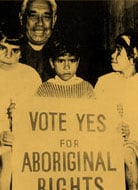- Aboriginal Rights:
- Collective rights rooted in historic cultural traditions and practices, based on ancestral use of the land.

- Rights as distinct peoples recognized in law and treaties
- Collective Rights: Rights held through membership to a group. All members have same rights.
- Areas of Concern:
- Self-government
- Land ownership
- Control of natural resources
- The Royal Proclamation, 1763
- The document reserved lands for Aboriginal people (“Indians”) and ordered people who had settled on those lands to leave.
- British Crown alone had the right to trade Aboriginal hunting and fishing grounds, but gave Aboriginals the right to hunt and fish on these acquired lands.
- The final results of such negotiations were to be recorded in written treaties.
- Historic Barriers to Equality
- Racist attitudes held by non natives
- Government policies and actions denying Native peoples their cultural heritage and collective rights
- 1871 – 1921: Land agreements used to remove Native peoples from their traditional lands to allow for European settlements
- Indian Act, 1876: policy of assimilation, banning of traditional practices, replaced Native self-government with elected band councils, rejected native justice and decisions regarding health care, social services and education under federal authority.
- 1960s: Residential schools; Cultural Genocide
- Extreme poverty
- Failure to provide for the educational needs of Native youth
- Some Significant Gains
- Aboriginals were allowed to sue the government over land claims.
- 1960, right to vote
- Drybones case 1970 (p. 207 – 208); removed non- drinking clause from the Indian Act.
- Landmark Decisions:
- Lavell Case (1974)
- Challenged status of Aboriginal women who married non-Aboriginal men.
- The Calder Case (1973) P. 209
- Legal claim to ancestral lands never surrendered
- Accepted concept of “Aboriginal title” as legal
- Trudeau government introduced process for negotiating land claims settlements as a result.
